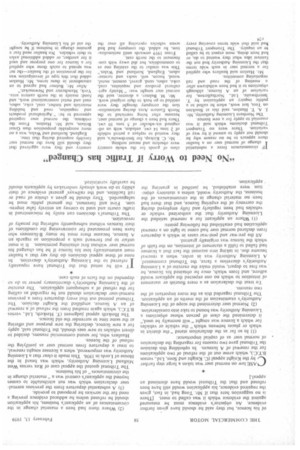"No Need to Worry if Traffic has Changed"
Page 68

If you've noticed an error in this article please click here to report it so we can fix it.
I F circumstances force a substantial change of normal user on a haulier there appears to be no reason why he should not apply to amend it by way of variation. There were no Transport Tribunal decisions which said it was essential to apply for a new licence.
The Northern Licensing Authority, Mr. I. A. T. Hanlon, said this at Stockton on Tees, last week, when he called to a public inquiry an application by T. Smirthwaite, Ltd., Northallerton, for variation of an A licence, although objections to it had been withdrawn after a meeting of the road and rail negotiating committee.
Mr. Hanlon said hauliers who applied for a normal user in such wide terms that the Licensing Authority had not the faintest idea what they wanted to do, or had been doing, must expect to be called to an inquiry. The Transport Tribunal had said that wide terms covering every (-21z class of goods for the whole country were obsolete and meant nothing.
Mr. C. Kirkup, for Smirthwaite's, said they wanted to replace a petrol vehicle of 2 tons 14 cwt. unladen, with an oilengined six-wheeler of 5 tons 10 cwt. There had been a change of normal .user. because after being restricted to the North Eastern Area during nationalization the company thought they were entitled to go back to their original work.
Mr. M. Bulmer. a director, said the normal user sought was: "Mainly agricultural produce and requisites, coal, coke, ashes, sand. gravel, cement, metal, wood, bacon, soil, sacks and tarmacadam, England, Scotland and Wales." This was similar to the existing one as to commodities, but did away with confinement to the north east.
From 1919 onwards until nationalization, he added. the company had had seven vehicles operating all over the country and they were aggrieved that they should still have the normal user forcibly acquired during that time.
England, Scotland and Wales. was a no more acceptable proposition than Great Britain, said Mr. Hanlon. From the evidence, the normal user required appeared to be: "Agricultural products and requisites, road and building materials and timber, coal, coke, ashes. steel and metal constructional work, and food; mainly in the north eastern area. York. Manchester and Newmarket."
After Mr. Bulmer had agreed to an amendment in these terms, Mr. Hanlon added that this type of investigation was for the protection of the haulier—the net was spread to catch those who applied for a licence for one purpose and used it for another, or added additional axles to their vehicles. No haulier need fear a genuine change in business if he sought the aid of his Licensing Authority.
















































































































